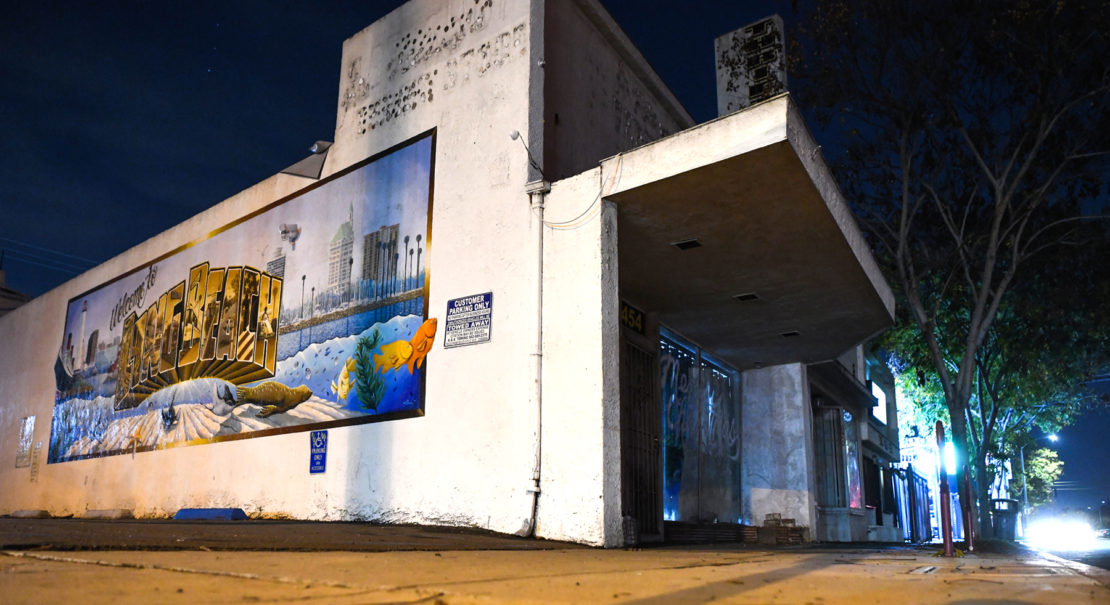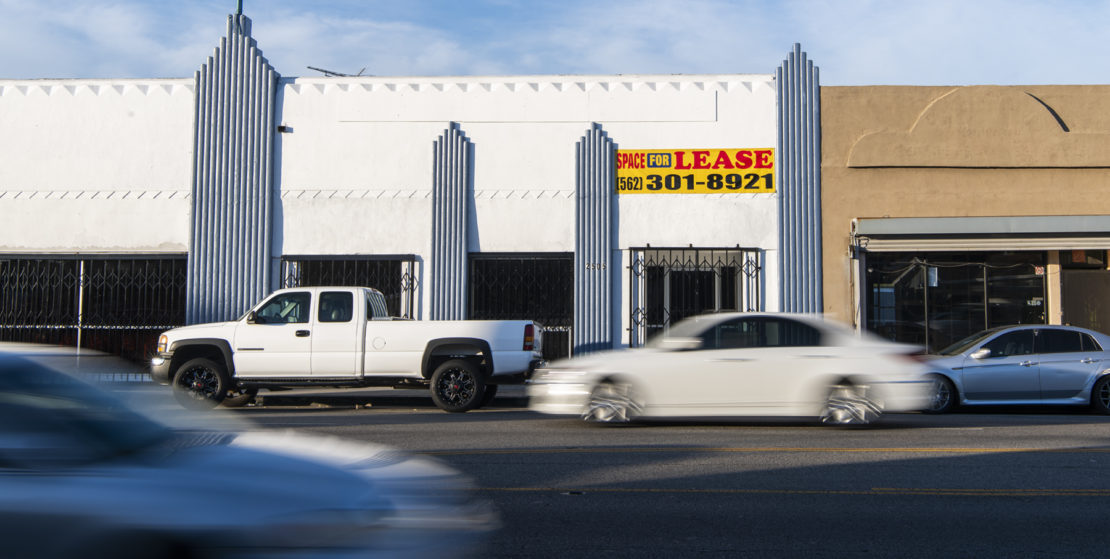From the outside, they often look like vacant storefronts: The former business’ signs occasionally still hang on the buildings, but now the windows are obscured.
Anyone who wants to get in has to knock first. If you walk by at night, you might hear the slapping sound of people hitting buttons on an arcade game.
Except, they aren’t playing just any arcade game and the prizes aren’t children’s toys. Police say the people inside are gambling—and they’re big business for the operators.
Illegal gambling operations have been popping up more frequently in Long Beach over the last year. From a former dollar store in Zaferia to an old thrift shop in North Long Beach, experts say these black-market businesses tend to appear where retail has taken a downturn.
There’s no definitive count on how many illegal gambling businesses there are in Long Beach, but, since July, police have shut down at least eight different locations spread across the city and detained dozens of people suspected of illegally gambling.
With the help of attentive residents, Long Beach police are trying to get rid of these illicit gaming parlors, which they say attract more serious criminal activities like drug sales, robberies and sometimes deadly shootings.
“If you look at the crime of gambling, it’s a low-level misdemeanor, but yet what we’re seeing around these locations are people carrying guns,” Police Chief Robert Luna told a group of concerned residents at a recent Coolidge Triangle Neighborhood Association meeting.
Recently, he said, one illicit gambling house was the scene of a robbery. Why? “There’s a lot of cash in there,” he said.


Police call these contraband businesses “slaphouses” after the button-slapping sound created by people playing the games, according to Aaron Alu, an acting lieutenant with the LBPD’s vice division.
A search warrant for a slaphouse on Pacific Avenue, which police raided in mid-October, said officials keep coming across “fish games,” a video arcade game where the player tries to catch various digital fish, whales and crabs that float in a screen laid into a table.
The games come from overseas, most often Japan, China or Korea, according to Timothy Fong, co-director of the Gambling Studies Program at UCLA.
“These are not traditional casino games that people are used to, you know, blackjack and craps tables,” Fong said. “These are a combination of video games and games of chance that are not available in brick-and-mortar casinos, so that’s why they have their own kind of flavor to them.”
Legal versions of these games are sometimes available in arcades like Dave & Buster’s or Chuck-E-Cheese, where players use a joystick to put out a line to catch sea creatures, he said. Fong specializes in gambling addiction and says the allure of fish games is heightened because it combines a game of skill and a game of chance.
“There’s something unique about this—and I don’t think unique to the game—I think it’s just because of the very simple format and it works and there’s a random element to it and there’s also a belief of a control to that random element, like: ‘I’m really good at timing,’” Fong said. “It’s that gamification of gambling.”
One of Fong’s biggest concerns is that with no regulation in these underground casinos, people with gambling addictions aren’t presented with any way to battle their compulsions. There’s likely no helpline for gambling addiction posted.

Raids on illegal gambling spots have been making headlines in California in recent years. In February of 2018, law enforcement raided a Westminster restaurant used for underground betting. Sheriff’s officials raided a Norwalk storefront and found computers used for illegal gambling in August 2018. And Oakland has been seeing its own rash of illegal gambling dens similar to Long Beach’s.
Long Beach police said they started becoming aware of these slaphouses last year. Several years ago, police had seen illegal gambling businesses materialize in internet cafes where people would quietly gamble online at computer stations, but the fish games were new, Alu said.
While some residents are quick to assume gangs are running these locations, police officials were hesitant to draw a definitive line, noting that they can attract gang members but they are not necessarily run by gangs. Some gangs, however, have seen an opportunity, offering to work security in exchange for a cut of the operation’s profits, according to the LBPD.
“These places, they can make a lot of money,” Alu said. “Talking to informants or people that actually have run these places, they can make somewhere between $3,000 and $6,000 a day. It’s a lot of money. And that’s why we’re seeing the crime occur, recently with the shooting.”
Two people have died and two have been wounded in three different shootings at illegal gambling parlors in Long Beach over the last six months. In the most recent incident on Jan. 14, a man was trying to rob the business and the man running it tried to stop him, police said. They both ended up shooting and wounding each other.
Long Beach police have carried out at least five raids on illicit gaming operations in the last six months. While the raids yield dozens of arrests, most of them are for outstanding warrants or charges not related to gambling. That’s because when police arrive, they usually don’t go busting down their doors. Instead, they take the precaution of having a SWAT team wait outside and call everyone out of the building, so they can’t see who was actually participating in the gaming, Alu said.
Currently, police say they can only charge suspects for gambling-related offenses if they can prove they were running a particular location or working as a cashier accepting wagers, police spokeswoman Shaunna Dandoy said. The charge is still only a misdemeanor and carries a maximum sentence of one year in prison or a fine of $5,000, or both.
So far, authorities in Long Beach have only been able to build cases against five people on suspicion of accepting wagers, police said.
As for the owners of the buildings that become slaphouses, police have put them on notice, saying they would be found criminally liable if they let their buildings get involved in illegal gambling again, officials said. In the case of the Jan. 14 shooting, the building owners told police they thought they were leasing to a cabinet maker.
Police officials said they are looking into reviewing the municipal code that makes it illegal to participate in the activity of gambling. They hope to change it to make it illegal to even be inside an illegal gambling business.
Luna said one of their best defenses against these slaphouses is concerned residents bringing the locations to police’s attention. However, police cannot always reveal when they’re closing in on a location for fear of ruining their chances of catching the criminals, Luna told residents at the recent community meeting.
When that happens, residents sometimes aim their concerns at other authority figures, like Councilman Rex Richardson, who represents North Long Beach and has worked with police and residents to root out some of the nuisance gambling houses.
“The police department moves very quickly in conducting surveillance and operations and I’m proud of how swift they responded to this,” Richardson said.

Residents in North Long Beach aren’t shy about tipping off police. Those in the Longwood and Coolidge Triangle neighborhood associations said they worked with each other and with the LBPD to get a location on Long Beach Boulevard shut down.
“Because we know our community so well, it was out of place,” said Renee Rios, president of the Longwood Neighborhood Association. “We saw a lot of people coming in and out of the building. It used to be a thrift store, so it wasn’t a very high traffic store.”
In the case of the shooting on Jan. 14, residents had already complained to police about the location, and detectives were in the process of writing a search warrant the morning the violence broke out, according to the LBPD.
At the neighborhood meeting, Luna encouraged residents to continue reporting suspicious activity and possible gambling houses.
The recent string of raids has made slaphouse operators nervous, according to police. They estimate there are now fewer operating in Long Beach than three or four months ago.
“We’ve shut down a lot and they haven’t come back,” Alu said.


